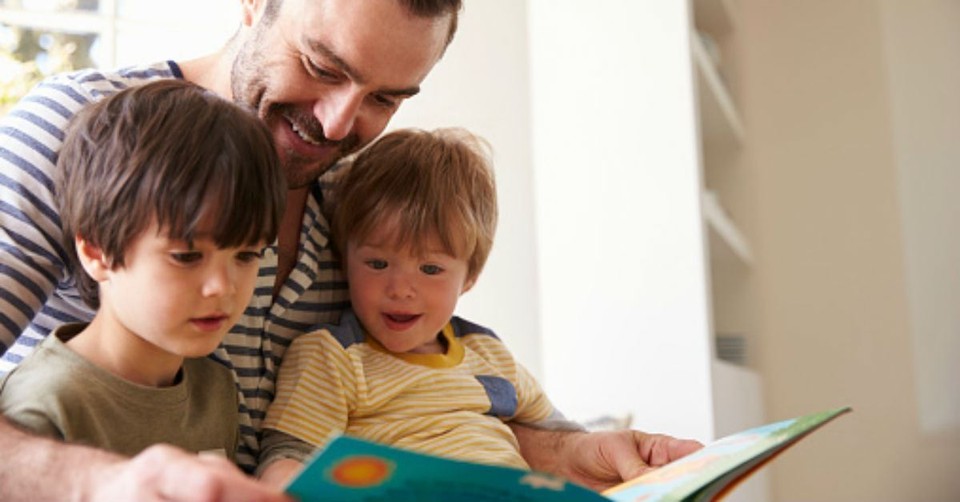3 Benefits of Reading to Your Kids (Even After They've Learned to Read)

When our kids are small, it’s a special joy to snuggle up with them on the couch or the bed or the big, comfy chair and read to them. We look at the pictures together, learn the rhymes together, and our hearts say, Yes. This is good. Good for them. Good for me. Good for us.
But as the kids grow, our focus shifts to teaching them how to read. First aloud to us, as we had done for them. And then silently, on their own. We look on with pride as they settle into their own favorite spots with a favorite book in hand, and we think, Yes. This is good. We’ve taught them well.
And we have. But does the family reading time have to end?
A few years ago, a teen said something that stuck with me: "I still love to listen to my mom read aloud to my younger siblings. Is that weird?"
My response was a hearty, "No!" As a lover of history, I was quick to point out that until a mere sixty years ago, reading was one of the few methods of entertainment available for a family in their home. Where now we might gather around a screen, earlier it was a radio. And before that, it was a book. When we peek into the pages of stories written in those eras before television and the internet, we find many tales of families enjoying a story together. They would take turns reading selections of poetry, sermons, treatises, and even fiction.
In our homeschool day, read-alouds are still an integral part of the education, and even when the school year is over, I’ll often sit with the kids on the couch and read to them. Not because they can’t read the book themselves, but … well, I think the but is actually pretty important.
Creating a Shared Family Experience
Reading together as a family offers so many wonderful benefits! We’ve chosen to read aloud books that we all want to read. Why wait our turn for the copy we own when we can just read it together? This results in the same thing that watching a movie together will do—it creates a shared experience. The words of the book enter our family vocabulary. We can make jokes based on the plot and characters. If it’s nonfiction, we frequently reference the discoveries and actions we read about as we go through daily life.
Fostering a Love of Literature (Even for Reluctant Readers!)
When I dig deeper, however, I discover even more beautiful side effects of this read-aloud family time. For starters, I have a reluctant reader. While his sister will spend half her summer with her nose buried in a book, my son will very rarely choose to pick up a book of his own volition. And yet he loves being read to, even though he’s ten. During our school-reading time, he’s always the one who says, "Read another chapter!" I’m occasionally concerned that he hasn’t developed a love for reading on his own, but then I remind myself that he still has a love of literature—one I’ve fostered by reading aloud to him nearly every day of his life. He’s being exposed to some of the greatest books in the English language, listening to things he might never have picked up on his own. Many of the titles in our curriculum are classics for middle grade readers that I certainly never read in my own youth. They weren’t assigned in my school, and I didn’t discover them on my own. Now we get to enjoy them together.
Opening a Dialog about Fun Things (Sad, Hard, and Tricky Things Too)
In this fast-paced world, family time is certainly precious. Spending it experiencing a story together, night after night, chapter by chapter, is something that has no substitute. And not only does it provide that common language and give our kids exposure to books they might never read on their own, it also opens up a dialogue—about fun things (would you like to see the Alps?), sad things (I can’t believe his father died! Did you think that would happen?), and even hard, tricky things. Sometimes we don’t know how to approach hard topics with our kids—things like violence, drug abuse, sexual issues, and prejudice. But through the vehicle of a good book, these topics can come up organically and provide a safe environment for discussion. This is a great way for us to talk about the things that matter most.
Maybe in today’s society it seems a little odd to sit down with middle and high school kids and read to them. But you know what? I wouldn’t trade it for the world. And I hope my kids say, "Read to me!" forever.
Roseanna M. Whiteis a bestselling novelist of Christian historical fiction, a graduate of the Great Books School, and the senior editor at WhiteFire Publishing (www.whitefire-publishing.com), which is launching WhiteSpark (www.whitespark-publishing.com), a juvenile fiction line, in autumn 2018. She is a diehard lover of literature who is eager to share the joy of books with anyone who will listen. When not homeschooling, she’s writing, designing book covers, and pretending her house will clean itself.
Copyright 2018, The Old Schoolhouse®. Used with permission. All rights reserved by the Author. Originally appeared in the Fall 2018 issue of The Old Schoolhouse® Magazine, the trade publication for homeschool moms. Read The Old Schoolhouse® Magazine free at www.TOSMagazine.com, or download the free reader apps at www.TOSApps.com for mobile devices. Read the STORYof The Old Schoolhouse® Magazine and how it came to be.
Photo Credit: Thinkstock/MonkeyBusinessImages
Originally published November 12, 2018.





